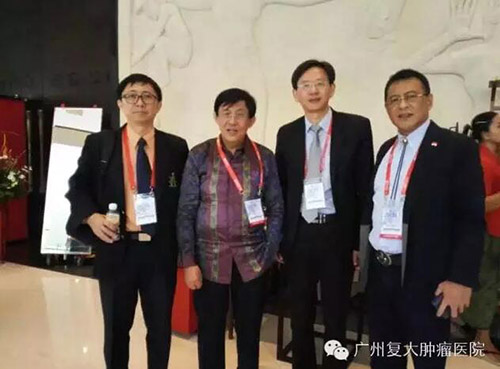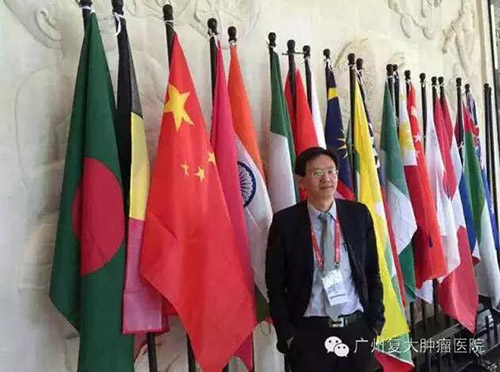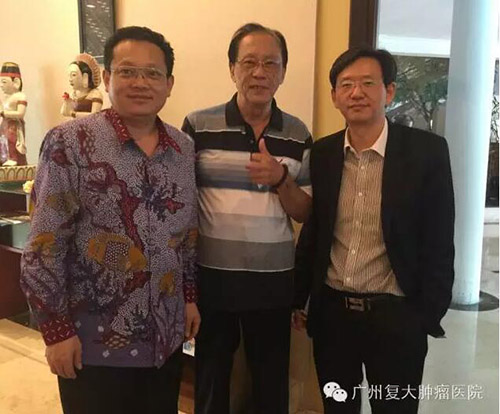ASEAN (International) Forum on Intestine Cancer Treatment was convened from April 6 to April 9, 2016 in Bali Indonesia. Dr. Niu Lizhi, the President of Guangzhou Fuda Cancer Hospital, attended the forum and made a keynote speech at the invitation of Dr. Barlian Sutedja, the Chairman of the forum. The forum, co-hosted by the Laparoscope Society of Indonesian Association of Medicine, the Surgery Society, the Esophageal Gastrointestinal Surgery Society and the Gastroendoscope Society, is themed on “innovative treatments bring about high-quality life” this year. This forum brought together over 500 experts and scholars from 22 countries and regions.

Dr. Niu Lizhi (R2) and participating experts
Experts from Japan, South Korea and Singapore focused on robot-assisted surgery; experts from Indonesia focused on laparoscopic surgery, coloscopic surgery, chemotherapy and radiotherapy. Dr. Niu Lizhi was invited to give a speech on cryo-ablation for intestine cancer with liver metastases. He focused on argon-helium cryosurgery for intestine cancer with liver metastases and the latest technology for cancer—NanoKnife. Dr. Niu is the only doctor in mainland China who has been invited to deliver a speech at the forum.

Dr. Niu Lizhi noted that cryo-ablation was approved by America FDA for clinical application in 2000. Fuda Cancer Hospital became the first few hospitals in mainland China to have introduced cryosurgery equipment in 2003. Percutaneous cryosurgery is a minimally invasive procedure that involves probes about 2-8 diameters in size. During the procedure, argon gas is used to lower the temperature of the tip of probes to -160℃ within dozens of seconds. Ice crystal will be formed inside and outside of the frozen cancer cells and induce avascular necrosis of cancer cells. Cryo-ablation has been used to treat benign and malignant tumors in liver, lung, breast, uterus, kidney, prostate, nerves, bones, etc. At present, Fuda Cancer Hospital has completed over 10,000 cases of cryosurgery, the number of which ranks the first in the world.
In June, 2015, Guangzhou Fuda Cancer Hospital initially introduced the latest technology for cancer treatment from America-Irreversible Electroporation (NanoKnife). It is clinically applicable for treating pancreatic cancer, liver cancer, etc. Irreversible Electroporation (NanoKnife), a minimally invasive procedure, is an emerging ablation method that will neither generate energy nor be influenced by external temperature. During the procedure, high electric-field and ultrashort pulses are given to destroy lipid bilayer structure of cancer cell membrane and form numerous irreversible nano-sized pores in the cell membrane. Tumor cell death is induced while surrounding nerves, blood vessels, intestinal canals, bile duct remain intact. Dr. Niu Lizhi noted that doctors at FUDA hope to bring about more survival benefits for cancer patients with the latest technology.
--------------------------------------------------------------------
After ASEAN (International) Forum on Intestinal Cancer Treatment concluded, Dr. Niu Lizhi and Dr. Liu Zhengping attended the lecture on cancer hosted by Surabaya Liberal Sodality and shared with cancer survivors ways for cancer prevention and the latest technology for cancer-NanoKnife.
On April 11, Dr. Niu Lizhi and Dr. Liu Zhengping visited patients that have recovered after receiving treatments at FUDA in Jakarta. The survival time after treatment is all over 3 years and the longest survival time as of now is over 12 years. Among them, breast cancer patient Affra Siowardjaja has survived over 12 years after receiving cryo-ablation, immunotherapy at Fuda Cancer Hospital and no recurrence is found as of now. Prostate cancer patient Fachrutdin Tjoe has survived 7 years after receiving cryo-ablation and interventional therapy in 2009; oral and liver lymphoma patient Yana Sari Putri Sihombing has survived 7 years after receiving cryo-ablation and chemotherapy at FUDA in 2009. These patients expressed their appreciation to Dr. Niu for coming all the way to visit them.

Dr. Niu Lizhi (R1) and Dr. Liu Zhengping (L1) visiting patient who have received treatment at FUDA
Dr. Niu Lizhi noted that cancer is still a worldwide problem. Though new drugs and new technologies are emerging by each passing day, cancer prevention should still come first. He suggested that the public should keep a good living habit by eating less red meat, more fresh fruits, quitting smoking and doing exercise regularly. People over 40 years old should pay more attention to cancer prevention screening so as to achieve early detection and early treatment.